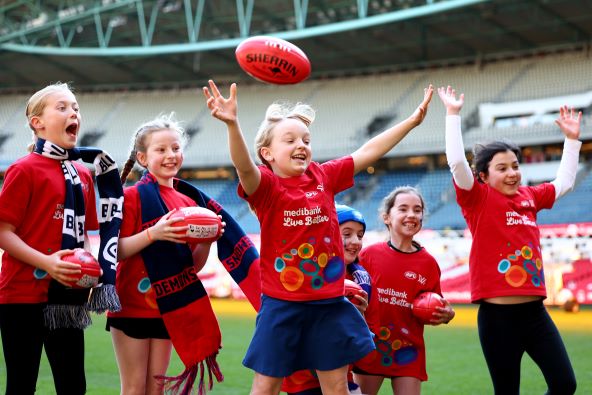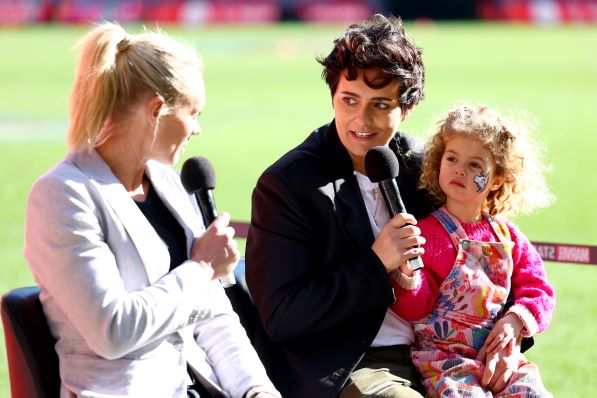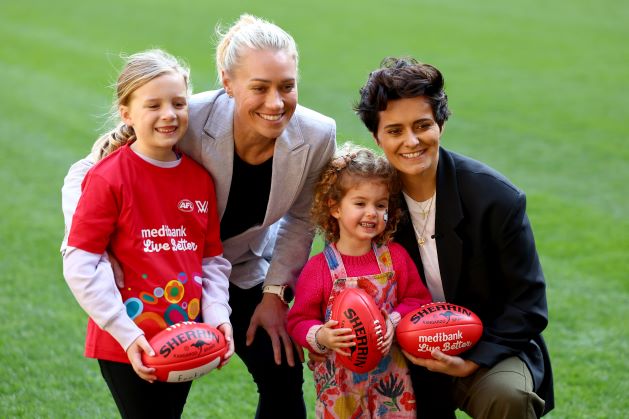“I was a 13-year-old kid playing against grown adults, which I loved … but at the same time, I wish I had the opportunity that's in place now”
When Erin Phillips and Moana ‘Mo’ Hope were coming up in their junior footy leagues, they were playing with the boys – because there was nowhere else for them to go.
Each player went on to become part of the founding generation of the AFLW and indisputable legends of the game.
Speaking in the stands at Marvel Stadium, at the launch of Medibank’s new three-year partnership with the AFLW as an Official Health Partner, Phillips says she had a good experience at her junior footy club, despite being the only girl.
“To be honest, my team and my club were amazing and made me feel like I was just another player,” she says.
Yet, Phillips gave up the sport at the age of 13 because of the lack of opportunity for girls, switching to basketball and going on to an illustrious career in the WNBA. She was only lured back to football at the age of 31, upon the creation of the AFLW.
Hope faced similar roadblocks as a young player.
“I played with the boys up until under 12,” she says. “I got to 12 years of age, and they just said to me, ‘Oh, you can't play no more.’
“And I said, ‘Why?’ And they said, ‘Because you're going to get boobs one day,’” she remembers.
She almost quit the sport – but ended up joining a women’s team.
“I was a 13-year-old kid playing against grown adults, which I loved … but at the same time, I wish I had the opportunity that's in place now,” she says.
While there are now more avenues for girls and young women to continue playing footy, research shows girls are still under-represented in organised sport compared to their male counterparts.
The 2023 Ausplay report from the Australian Sports Commission found that 28% of men aged 15 and over participate in a sporting club in Australia, compared with only 16% of women.
As well as the ongoing need for more inclusive environments and infrastructure, girls and young women have specific health experiences that could lead to them turning away from sport altogether.
Hope and Phillips say, while some progress has been made since their playing days, more research, investment, and awareness around gender-specific health issues for athletes are still needed.
So, what are some of the health challenges that female players face? And what is being done to lessen their impacts?

Medibank. Superfans of the AFLW.
Everybody deserves the chance to reach their full potential. That’s why we’ve joined forces with the AFLW as an Official Health Partner, to help tackle the health barriers facing women in sport.
Menstrual cycles
“But women's bodies are different; every woman's body is different”
Periods can be a pain at the best of times – but especially problematic when you need your body to be at peak performance out on the field.
The pair say more understanding of menstrual cycles and how to work with them rather than against them is emerging – but a research gap still exists.
“Things like taking away white shorts is helpful,” says Phillips, in reference to a uniform change in the league in 2022, which means players no longer have to wear the traditional away-game shorts.
“I learned more post-game about my menstrual cycle and getting the most out of it from a physical perspective,” says Hope.
“There are parts of your menstrual cycle where you perform or you lift more, and parts where you don't.
“I didn't learn that throughout my AFLW career – I wish I had, because I would know how to get more out of my body.”
Hope adds that having a more personalised understanding of individual biology is also helpful.
“Back then it was just, everyone's generic,” she says.
“But women's bodies are different; every woman's body is different.”
ACL injury risk
The dreaded, often career-ending ACL injury is a major risk for AFLW players. Some studies show that women are five times more likely to suffer an ACL injury than men.
“I’ve swiped the card twice on that,” says Phillips, wryly, who famously sustained a brutal ACL injury in the 2019 AFLW Grand Final and had done so previously playing basketball.
A research partnership between the Medibank Better Health Foundation and La Trobe University has now included over two thousand female Australian rules players in a project that aims to increase understanding and reduce the risk of ACL injury in women.
Phillips says, while awareness of the issue is growing, research and investment remain crucial.
She says remaining clear on the risks and knowing the right warm-ups are critical, across all leagues and age groups.
“We can't take shortcuts, no matter what league we’re in.”

Fertility and pregnancy
“I was never in a position where I was able to have kids – because if I sat out a season, it would have been very detrimental to my basketball career, so it just wasn't financially viable for me to ever do that”
A looming question for many female athletes is whether they will be able to start a family while continuing a sporting career.
“It’s why I stopped playing AFLW,” says Hope, who has since accessed IVF and given birth to her second child.
For Phillips, and many of her teammates, she had to weigh up her options.
“I was never in a position where I was able to have kids – because if I sat out a season, it would have been very detrimental to my basketball career, so it just wasn't financially viable for me to ever do that,” she says.
“Luckily, I met someone who was wanting and willing to carry but, financially, for us both, it was really the only option.”
Phillips says some sporting leagues, such as the WNBA, are now supporting players with fertility plans, including helping them freeze their eggs. In her view, many of her teammates have struggled to start a family after having to put off starting a family.
“They've had to play for so long, because that's how they've paid bills; they’ve got to the end of their career, tried, and had really little success,” she says.
“I was lucky in the sense that I didn't have to sit out a career to start a family – Mo did – so I can't speak from the physical component of what it would take to come back from having a kid.”
“I'm two years, one month in, and I still haven't got my body right,” says Hope.
“There are so many issues post. I'm not saying, ‘It's horrible, don't do it’ – I don’t want to scare people away from doing it – but there's a lot to recover.”
High-profile athletes from other sports – such as tennis champ Naomi Osaka – have also recently acknowledged the challenges that come with returning to elite sport post-pregnancy.
Body image
“Something that I'm trying to teach my kids is, being healthy is really cool”
Something that cuts across all genders is the struggle with body image and resulting self-esteem. Adolescence, of course, can be an especially vulnerable time for girls.
“Social media is a double-edged sword for this,” says Hope.
“Something that I'm trying to teach my kids is, being healthy is really cool,” says Phillips.
“Respect your body; respect what it can do, not what it looks like.”
She says she’s “come full circle” and is currently a coach at the junior league in South Australia where she started out. This season, she’s been coaching under 8s players, including one of her own daughters.
Phillips says, as a coach, she witnesses all the benefits that young people gain when playing in a team – and it hammers home the importance of keeping young girls engaged.
“Honestly, when she goes out to play football, she lifts to another level of personality,” she says of her daughter, Brooklyn.
“I don't care whether she plays football or another game, but I'd love her to stay in sport because of the things that it can teach you as a person … the resilience piece, the losing piece, things about your body, about life – there are so many great lessons in sport.”

